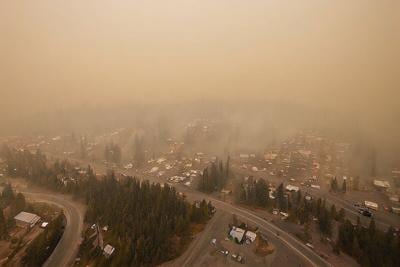Key Takeaways
Wildfire smoke is associated with an increased risk of heart failure
Heart failure risk increased as particle pollution from wildfire smoke rose
Women, seniors and low-income folks were most affected
THURSDAY, June 3, 2025 (HealthDay News) -- Wildfire smoke might increase a personŌĆÖs risk of developing , a new study suggests.
People had a 1.4% higher risk of heart failure for every 1 microgram per cubic meter increase in their exposure to particle pollution from wildfires, researchers report in the .
That might not sound like a lot, but researchers say this translates into more than 20,000 additional heart failure cases each year among U.S. older adults.
ŌĆ£Over time, the average smoke pollution someone breathes in can increase very slightly ŌĆö but that slight increase matters a lot for heart health, especially for vulnerable populations,ŌĆØ said lead investigator , a research scientist at the Emory University Rollins School of Public Health in Atlanta.
ŌĆ£Even a small individual risk translates into a large public health impact,ŌĆØ Hao added in a news release.
Currently, national air quality standards limit particle pollution to an average 9 micrograms for every cubic meter of air over the course of a year, according to the .
During the 2020 wildfire season, particle pollution in Oregon leapt from an average 7.7 micrograms per cubic meter to 63.5 micrograms per cubic meter, a by the U.S. Centers for Disease Control and Prevention found.
For the new study, researchers tracked the heart health of about 22 million Medicare patients based on their exposure to particle pollution from wildfires between 2007 and 2018.
They found that as levels of air pollution from wildfire smoke increased over a two-year period, so too did peopleŌĆÖs risk of developing heart failure.
ŌĆ£We also found that the association between smoke (particle pollution) and heart failure was stronger in women, Medicaid-eligible individuals and those living in lower income areas, indicating higher susceptibility,ŌĆØ Hao said.
Particle pollution involves tiny bits of matter released by combustion that are less that 2.5 micrometers in diameter, the says. By comparison, a human hair is 70 micrometers.
Precisely how exposure to┬Āparticulate pollution from wildfire smoke┬Āincreases risk for heart failure is not fully understood yet, but these particles can penetrate deep into the lungs and even enter the bloodstream, posing serious health risks to those exposed, researchers said.
The study also found that wildfire smoke is potentially more toxic than the particle pollution emitted by cars and power plants. Those sources of particle pollution only increased peopleŌĆÖs risk of heart failure by 0.5%, results show.
ŌĆ£By century's end, under a high greenhouse gas emission scenario, we expect 74% of the globe to experience substantial increases in the length of wildfire season and the frequency of wildfire events,ŌĆØ , an associate professor of epidemiology at the University of Washington in Seattle, said in a news release.
ŌĆ£This is already the case in the United States, where wildfire smoke days, once rare, now happen several times per year,ŌĆØ added Casey, who wrote an editorial accompanying the new study but was not involved in the research.
The study ŌĆ£highlights a growing and unappreciated threat to heart health,ŌĆØ , the journalŌĆÖs editor-in-chief, said in a news release.
ŌĆ£As wildfire smoke becomes more frequent and intense, we are learning that even small, long-term exposures can raise the risk of heart failure, especially among the most vulnerable,ŌĆØ continued Krumholz, who was not involved in the research. ŌĆ£These findings elevate the urgency of protecting communities through both environmental policy and health care preparedness.ŌĆØ
More information
The Environmental Protection Agency has more on .
SOURCE: American College of Cardiology, news release, June 23, 2025
What This Means For You
Take steps to avoid particle pollution from wildfires including staying indoors with windows and doors closed and using air purifiers with HEPA filters when air quality is poor.
















(0) comments
Welcome to the discussion.
Log In
Keep it Clean. Please avoid obscene, vulgar, lewd, racist or sexually-oriented language.
PLEASE TURN OFF YOUR CAPS LOCK.
Don't Threaten. Threats of harming another person will not be tolerated.
Be Truthful. Don't knowingly lie about anyone or anything.
Be Nice. No racism, sexism or any sort of -ism that is degrading to another person.
Be Proactive. Use the 'Report' link on each comment to let us know of abusive posts.
Share with Us. We'd love to hear eyewitness accounts, the history behind an article.